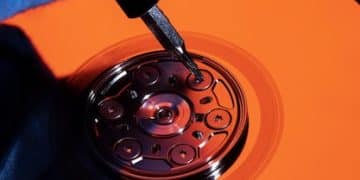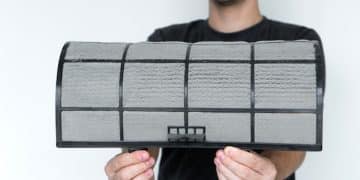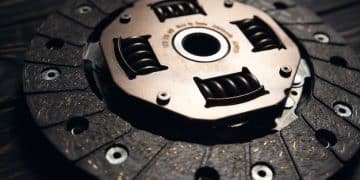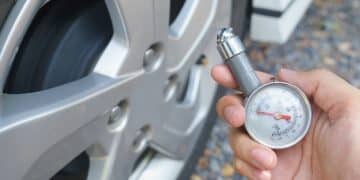Extend Your Car’s Life: Top 7 Maintenance Tasks for 2025

Extending your car’s life in 2025 involves performing seven essential maintenance tasks every six months, including oil changes, tire rotations, brake inspections, fluid checks, battery tests, filter replacements, and hose and belt checks to ensure optimal performance and longevity.
Want to keep your car running smoothly and reliably for years to come? Extend Your Car’s Life: 7 Essential Maintenance Tasks to Perform Every 6 Months in 2025 can make a significant difference. Regular maintenance prevents major issues, saves money on repairs, and ensures your vehicle operates at its best.
Why Bi-Annual Car Maintenance is Crucial
Performing car maintenance every six months might seem frequent, but it’s a proactive approach that pays off in the long run. Regular check-ups can catch minor problems before they escalate into costly repairs. Neglecting maintenance can lead to decreased fuel efficiency, reduced performance, and even safety hazards.
Preventing Costly Repairs
One of the primary benefits of bi-annual maintenance is the prevention of expensive repairs. Identifying and addressing small issues like worn brake pads or low fluid levels can prevent major component failures. For example, a simple oil change can prevent engine damage caused by dirty oil.
Ensuring Safety
Regular maintenance is also crucial for ensuring your safety on the road. Brake inspections, tire checks, and headlight adjustments are all essential for safe driving. By keeping your car in top condition, you reduce the risk of accidents caused by mechanical failure.
- Reduced Repair Costs: Catching small issues early prevents them from becoming major problems.
- Improved Safety: Regular checks ensure all safety components are functioning correctly.
- Increased Fuel Efficiency: A well-maintained engine runs more efficiently, saving you money on gas.
- Extended Vehicle Life: Consistent care helps your car last longer, reducing the need for frequent replacements.
Ultimately, bi-annual car maintenance is a cost-effective and safety-conscious practice that contributes to the longevity and reliability of your vehicle. The investment in regular check-ups is significantly less than the potential expenses of neglecting your car’s needs.
1. The Importance of Regular Oil Changes
Oil changes are arguably the most critical maintenance task you can perform on your vehicle. Engine oil lubricates the engine’s moving parts, reduces friction, and helps dissipate heat. Over time, oil breaks down and becomes contaminated, reducing its effectiveness and potentially causing engine damage.
Choosing the Right Oil
Selecting the correct type of oil for your vehicle is essential. Consult your owner’s manual for the manufacturer’s recommendation regarding oil viscosity and specification. Using the wrong oil can lead to poor engine performance or even damage.
Recognizing When to Change Your Oil
While the standard recommendation is every six months or a certain mileage interval (e.g., 5,000 miles), it’s crucial to monitor your oil’s condition. Dark, gritty oil indicates that it’s time for a change. Some vehicles also have oil life monitoring systems that alert you when an oil change is needed.
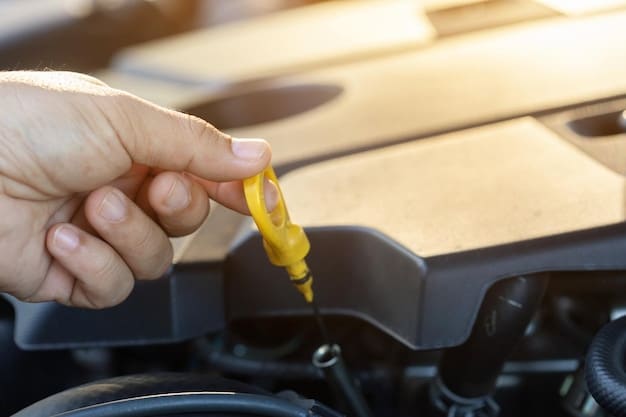
- Improved Engine Performance: Fresh oil ensures smooth engine operation and optimal performance.
- Extended Engine Life: Regular oil changes prevent wear and tear on engine components.
- Better Fuel Efficiency: A well-lubricated engine runs more efficiently, improving gas mileage.
Regular oil changes are a simple yet vital aspect of car maintenance. By adhering to the recommended intervals and using the correct type of oil, you can significantly prolong the life and performance of your engine.
2. Tire Rotation and Inspection for Safety
Tires are your car’s direct connection to the road, making their condition paramount for safety and performance. Tire rotation involves moving the tires to different positions on the vehicle to ensure even wear. Regular inspection helps identify issues like uneven wear, damage, or low tread depth.
Why Rotate Your Tires?
Different tires on your car experience varying amounts of wear due to factors like drivetrain configuration (front-wheel drive, rear-wheel drive) and driving habits. Rotating your tires helps distribute wear evenly, extending their lifespan and maintaining consistent handling and braking performance.
Inspecting Your Tires
Regularly inspect your tires for signs of damage, such as cuts, bulges, or embedded objects. Check the tread depth to ensure it meets the legal minimum requirement. Uneven wear patterns can indicate issues like misaligned wheels or suspension problems.
- Extended Tire Life: Even wear prolongs the life of your tires, saving you money on replacements.
- Improved Handling: Consistent tread depth ensures optimal grip and handling.
- Enhanced Safety: Proper tire condition reduces the risk of blowouts and accidents.
Tire rotation and inspection are essential for maintaining the safety and performance of your vehicle. By rotating your tires regularly and inspecting them for damage, you can ensure a smooth, safe, and cost-effective driving experience.
3. Brake Inspection and Pad Replacement
Your car’s braking system is critical for safety, and regular inspection is essential to ensure it’s functioning correctly. Brake pads wear down over time due to friction, and worn pads can compromise your car’s ability to stop effectively. Ignoring brake maintenance can lead to dangerous situations.
Identifying Brake Issues
Pay attention to any unusual noises or vibrations when braking. Squealing, grinding, or pulsating sensations can indicate worn brake pads or other brake system problems. Also, check the brake fluid level regularly, as low levels can affect braking performance.
The Importance of Brake Pad Replacement
When brake pads wear down, they become less effective at stopping your car. Continuing to drive with worn pads can damage the rotors, leading to more expensive repairs. Replacing brake pads at the recommended intervals is crucial for maintaining optimal braking performance.
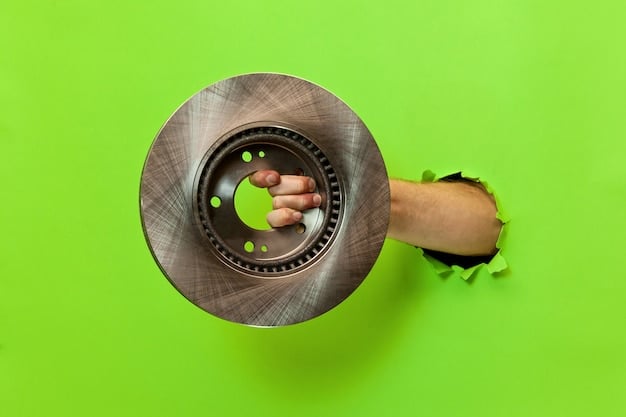
- Enhanced Safety: Properly functioning brakes are essential for avoiding accidents.
- Reduced Repair Costs: Replacing brake pads prevents damage to rotors and other brake components.
- Improved Braking Performance: New brake pads provide optimal stopping power.
Ensuring your brakes are in top condition is a critical aspect of car maintenance. Regular inspections and timely brake pad replacements are essential for maintaining the safety and reliability of your vehicle.
4. Checking and Topping Off Essential Fluids
Your car relies on various fluids to function correctly, including engine oil, coolant, brake fluid, power steering fluid, and windshield washer fluid. Regularly checking and topping off these fluids is essential for maintaining optimal performance and preventing damage to critical components. Low fluid levels can lead to overheating, reduced braking performance, or other issues.
Coolant (Antifreeze)
Coolant helps regulate engine temperature, preventing overheating in hot weather and freezing in cold weather. Check the coolant level in the reservoir regularly and top off as needed. Also, inspect the coolant for signs of contamination or corrosion.
Brake Fluid
Brake fluid is essential for transmitting braking force from the pedal to the brakes. Check the brake fluid level in the master cylinder and top off if necessary. Use the correct type of brake fluid as specified in your owner’s manual.
- Optimal Engine Performance: Maintaining proper fluid levels ensures smooth engine operation.
- Prevention of Overheating: Adequate coolant levels prevent engine overheating.
- Reliable Braking: Sufficient brake fluid ensures consistent braking performance.
Regularly checking and topping off essential fluids is a simple yet vital maintenance task. By keeping your car’s fluid levels at the recommended levels, you can prevent damage to critical components and ensure optimal performance.
5. Battery Check and Maintenance
Your car’s battery provides the electrical power needed to start the engine and operate various electrical components. Over time, batteries can degrade due to age, temperature fluctuations, and other factors. Regular battery checks and maintenance can help extend its lifespan and prevent unexpected breakdowns.
Checking Battery Terminals
Inspect the battery terminals for corrosion, which can impede electrical flow. Clean the terminals with a wire brush and apply a corrosion protection spray. Ensure the terminals are securely fastened to the battery posts.
Testing Battery Voltage
Use a voltmeter to check the battery’s voltage. A fully charged battery should read around 12.6 volts. If the voltage is significantly lower, it may indicate a weak or failing battery. Consider having the battery load-tested by a professional.
- Reliable Starting: A healthy battery ensures your car starts reliably.
- Extended Battery Life: Regular maintenance helps prolong the battery’s lifespan.
- Prevention of Breakdowns: A well-maintained battery reduces the risk of unexpected breakdowns.
Maintaining your car’s battery is essential for reliable operation. Regular checks and maintenance can help extend its lifespan and prevent unexpected breakdowns, ensuring you’re never stranded with a dead battery.
6. Replacing Air and Cabin Filters
Air and cabin filters play crucial roles in maintaining your car’s performance and air quality. The engine air filter prevents dirt and debris from entering the engine, while the cabin air filter cleans the air entering the passenger compartment. Replacing these filters regularly improves engine efficiency and enhances air quality.
Engine Air Filter
A clogged engine air filter restricts airflow to the engine, reducing performance and fuel efficiency. Inspect the air filter regularly and replace it when it appears dirty or clogged. A clean air filter ensures the engine receives the proper amount of air for optimal combustion.
Cabin Air Filter
The cabin air filter removes dust, pollen, and other contaminants from the air entering the passenger compartment. A clogged cabin air filter can reduce airflow through the vents and create a musty odor. Replacing the cabin air filter regularly improves air quality and enhances the comfort of your driving experience.
- Improved Engine Performance: A clean air filter ensures optimal airflow to the engine.
- Enhanced Air Quality: Replacing the cabin air filter improves air quality in the passenger compartment.
- Increased Fuel Efficiency: A clean air filter helps the engine run more efficiently, improving gas mileage.
Regularly replacing your car’s air and cabin filters is a simple yet effective maintenance task. By ensuring these filters are clean and functioning properly, you can improve engine performance, enhance air quality, and enjoy a more comfortable driving experience.
7. Inspecting Hoses and Belts for Wear
Hoses and belts are essential components that play a critical role in your car’s engine and cooling systems. Hoses carry fluids like coolant and power steering fluid, while belts drive components like the alternator, water pump, and air conditioning compressor. Regularly inspecting these components for wear and tear is essential for preventing breakdowns and maintaining optimal performance.
Checking Hoses
Inspect all hoses for cracks, leaks, or bulges. Squeeze the hoses to check for softness or brittleness, which can indicate degradation. Replace any hoses that show signs of wear or damage to prevent leaks and potential engine damage.
Inspecting Belts
Check all belts for cracks, fraying, or glazing. Make sure the belts are properly tensioned and aligned. A worn or loose belt can cause components like the alternator or water pump to malfunction, leading to engine overheating or other issues.
- Prevention of Breakdowns: Regular inspection can catch potential issues before they lead to breakdowns.
- Optimal Engine Performance: Properly functioning belts and hoses ensure all components operate correctly.
- Reduced Repair Costs: Addressing minor issues early can prevent more extensive and expensive repairs.
Inspecting your car’s hoses and belts regularly is a proactive maintenance task that can prevent costly breakdowns and ensure optimal performance. By addressing signs of wear and tear promptly, you can keep your car running smoothly and reliably.
| Key Point | Brief Description |
|---|---|
| 🚗 Oil Change | Essential for engine lubrication and longevity. |
| 🔄 Tire Rotation | Ensures even wear, improving safety and tire life. |
| 🛑 Brake Check | Critical for safety; replace worn pads promptly. |
| 🔋 Battery Test | Ensures reliable starts and prevents breakdowns. |
[Frequently Asked Questions]
▼
Regular oil changes keep your engine properly lubricated, reducing friction and preventing wear. Clean oil also helps dissipate heat and remove contaminants, extending the life of your engine.
▼
Tire rotation is generally recommended every 6,000 to 8,000 miles, or about every six months. This practice helps ensure even wear across all tires, maximizing their lifespan and maintaining optimal handling.
▼
Common signs that your brake pads need replacing include squealing or grinding noises when braking, a pulsating brake pedal, or a noticeable decrease in braking performance. Have your brakes inspected immediately if you notice these signs.
▼
Replacing air filters ensures that your engine receives clean air for combustion, improving fuel efficiency and engine performance. Cabin air filters keep the air inside your car clean, reducing allergens and pollutants.
▼
Check the battery terminals for corrosion and ensure they are tight. Use a voltmeter to measure the battery’s voltage; a reading below 12.6 volts may indicate a weak battery. A professional load test can provide a more accurate assessment.
Conclusion
By following these seven essential maintenance tasks every six months in 2025, you can drastically extend the life of your car, ensuring it remains a reliable and safe mode of transportation for years to come. Regular maintenance not only saves you money on costly repairs but also enhances your driving experience and ensures peace of mind on the road.
